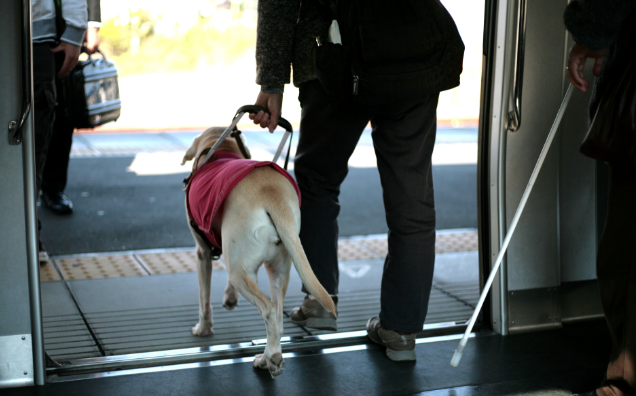- TOP >
- Efforts of Sign with Me
Efforts of Sign with Me 1F, Bunkyo Civic Center, 4-15-14, Hongo, Bunkyo-ku, Tokyo
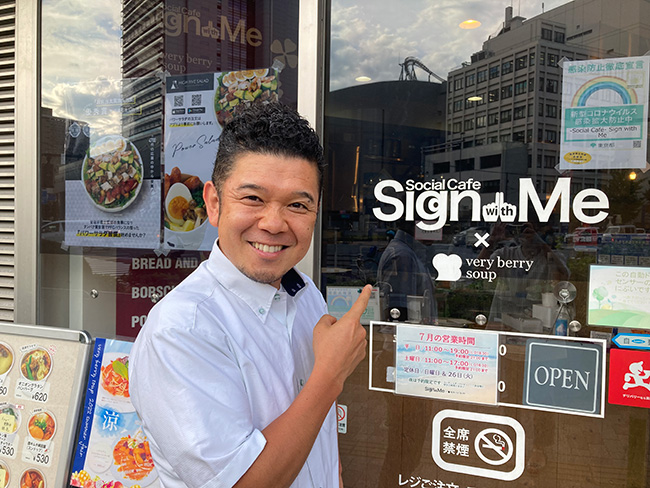 Interviewee: Mr Yanagi, Representative Director
Interviewee: Mr Yanagi, Representative Director
We heard that there is a café in Bunkyo-ku where you order by sign language and handwriting, so we visited it. The Representative Director, Masahiro Yanagi, told us that it is not only a café using sign language, and their efforts on the employment of people with disabilities and building a symbiotic society.
 Interviewee: Mr Yanagi, Representative Director
Interviewee: Mr Yanagi, Representative Director
The impact of the spread of Covid-19
In 2011 the first café was opened near the Red Gate of the University of Tokyo at Hongo. This Kasuga branch is the second one. The Bunkyo ward wanted to rent this place to a company which is actively employing people with disabilities and operating. The Hongo branch was highly regarded so our proposal was chosen out of few companies, and we opened the café near the intersection of Kasuga in 2016.
Covid-19 happened in early 2020 had a bad impact on restaurants. The first branch at Hongo was also affected and merged to the second branch at Kasuga as a result. Before covid-19 there were around 17 employees including part-time staffs, but now there are only 4 left.
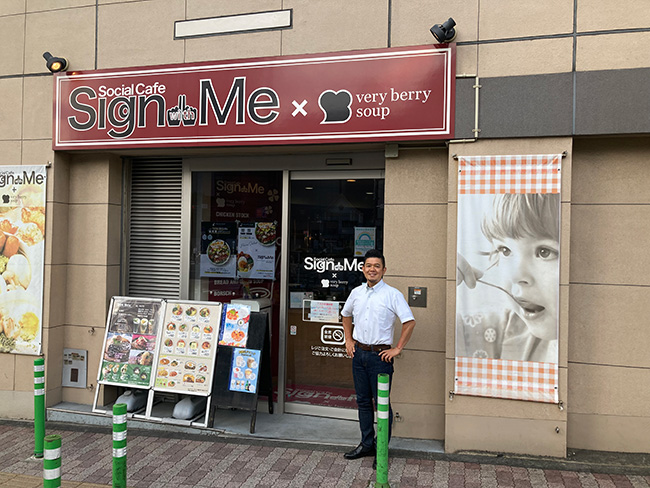 The exterior of the café. A large menu is shown outside the shop.
The exterior of the café. A large menu is shown outside the shop.
The story of starting food and beverage business
The parent organization is “General Incorporated Association Arigatou no Tane”. I originally worked at an employment agency for people with disabilities. At that time, I dealt with the problem of the high quit rate of people with hearing loss compared to other disabilities. I think the problem of the employment of people with hearing loss is communication, which can only be solved fundamentally by the individual myself, so I decided to start my own business. The content is food and beverage business and learning support business. There is a story why I chose food and beverage business.
When I was looking for hints for my business model, I went to an Indian restaurant. Yet the menu was in a foreign language which is not Japanese nor even English. I was hungry so I said rudely, “Here is Japan!” I had no choice but ordered by the photos. Yet the food was so delicious that I became a regular customer. At that time, I noticed I had bias. I had an image of how an Indian should be like, but when I looked around the restaurant, I noticed that there were various kinds of Indians. I was ashamed that I had stereotypes and at the same time, I realized that prejudice is born from ignorance. Because of this experience, I got the idea that even the languages are different, as long as the food is good there will be profit, and it links to the employment of people with communication problems, and thus developed their occupational field of customer service. The most important thing is that through the service, individuals can express themselves to the customers directly without a third person, and become role models. I believed food and beverage business can achieve the three goals below with the keyword of “ownership” at the same time.
1. Creating individuals’ employment by the concerned individuals themselves
2. Developing individuals’ occupational field by the concerned individuals themselves
3. Sharing about individuals as role models by the concerned individuals themselves
As a result, I decided to start food and beverage business.
 The exterior of the café. A large menu is shown outside the shop.
The exterior of the café. A large menu is shown outside the shop.
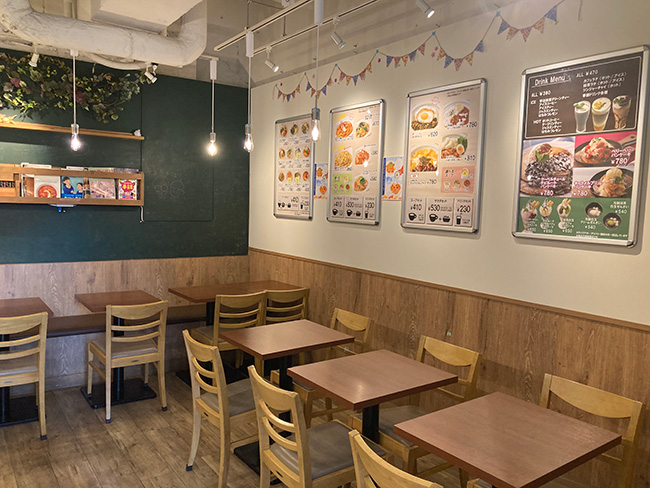 The interior of the café. Tea parties by sign language are held two times a week.
The interior of the café. Tea parties by sign language are held two times a week.
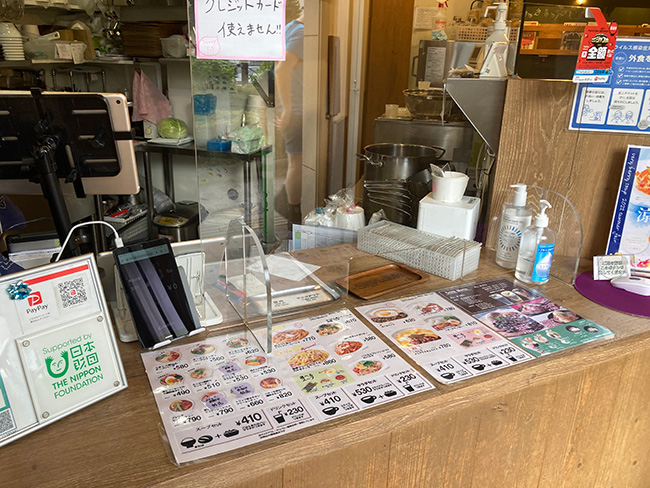 The order counter. Orders are made by pointing and handwriting.
The order counter. Orders are made by pointing and handwriting.
“Soup café” instead of “sign language café”
When I started the food and beverage business, my goal was not only about welfare, but to create a win-win relationship as a business, so I considered franchise from the start. In order to get franchise, I brought my proposal to around 50 companies but were all rejected. Only Very Berry Soup thought this is interesting and contracted with us. Now there are other sign language cafes but I am proud that we were the epoch.
Our café was interviewed by many mass media, yet we still received looks from people without hearing loss. The looks come with sympathy that “this is a café where people with hearing loss are working hard”. Our café is simply a soup café, not a sign language café. The only difference is that the official languages are Japanese Sign Language and Written Japanese (handwriting), and all communication in operation is in sign language. Still we take care of the needs of customers who are interested in sign language, so we hold a tea party event called “sign language de café” with a small number of participants two times a week.
An interesting thing is that to our surprise, “no voice from waiters” becomes a selling point and people who do not want to hear from waiters use our café. They make us aware of the value which the concerned party cannot notice, and I again realized the importance of an environment where you can meet a lot of people.
 The interior of the café. Tea parties by sign language are held two times a week.
The interior of the café. Tea parties by sign language are held two times a week.
 The order counter. Orders are made by pointing and handwriting.
The order counter. Orders are made by pointing and handwriting.
Arigatou no Tane
People with disabilities often say “thank you” to people but seldom be told by others. However, by creating an environment (shop) where they can utilize their abilities, they can receive many “thank you”. Instead of “independence” in the idea of welfare but by “autonomy” in the idea of business, people think and act on own and they will be able to get “thank you”. That is why I named the company “Arigatou no Tane” (seed of thank you).
 social media accounts
social media accounts
Tokyo, a city that is accessible everywhere to anyone.
Sightseeing where you wish, as you wish.
This ability to travel anywhere you please makes life that much richer.
Tokyo welcomes your visit.
Here you can encounter tradition,
history, culture, nature, technology,
and, best of all, smiling faces.
Making tourism closer and more
enjoyable through accessible tourism.




